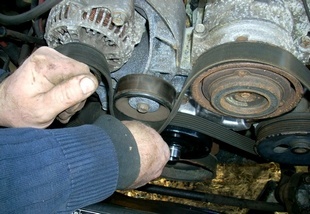
How to eliminate the whistling of the alternator belt
Content
During the operation of the car, the owner is faced with many problems, including an unpleasant situation with the alternator belt. He starts, seemingly for no reason, “whistling”, and guessing right away why this is happening is not so easy. In our case, we are not talking about a worn or old belt. Everything is clear here - I replaced everything. No, everything is much more interesting, and, as in an exciting English detective story, we will look for a causal relationship.
Inspection of the belt and search for reasons why the belt whistles.
So, why is the new alternator belt "whistling"? As it turns out, there are several reasons for this, and all of them are presented below.
Briefly about the hinged belt
Belt drive is the most common way to transfer rotation to the generator rotor. The method has been used for a long time and differs from others in its simplicity: there are only two pulleys on the shafts, which are connected by a belt.
The belt itself is responsible for a lot. It is he who is responsible for transmitting rotation from pulley to pulley. You should know that one part of the belt is tighter than the other. It is the difference between these tensions that determines the traction force and its coefficient.
The belt provides a clear transmission and is quiet in operation. High-quality products are able to withstand prolonged loads, smooth out shocks and jerks. They are compact, take up little space, but simultaneously operate several important vehicle components: a generator, a pump, an air conditioning compressor and a power steering pump.
The generator rotor must constantly rotate. This is facilitated by just a belt connection with the crankshaft. The pulleys that are screwed onto the shafts of the generator and the crankshaft are connected by a belt, which must be flexible.
The “whistling” of the belt is similar to a disgusting clang. It is caused by the fact that the belt slips. The sound from such a whistle is unpleasant and can be heard at a great distance. Of course, you should not drive in such a situation.
Belt whistle and its causes
Some car owners refer to the fact that supposedly the belt is of poor quality and carry out a replacement, but everything starts over again. For this reason, in order not to lose precious time and extra money, it is recommended to inspect the entire belt drive. Analyzing the conditions under which a whistle appears is the most useful judgment that a car owner makes.
The check comes down to the following:
- checking the integrity of the belt (we agree with the version that today even new products can be of poor quality);
- checking the tension (as you know, belt squeaks often occur due to weak tension);
- shaft cleanliness is checked (also one reason for "whistling", as detailed below);
- the line of two pulleys is checked for cm also.
Five basic reasons why the generator whistles
The following is a list of the most common causes of alternator belt whistling:
- The cleanliness of car parts is an important rule that the owner of the vehicle must comply with. Oil, which is random hit the belt or shaft, causes an unpleasant squeak. This happens due to the fact that the belt loses its former grip on the surface of the shaft and slips.If you remove the belt, and then carefully remove all traces of oil with a rag soaked in gasoline, then the problem can be solved.
- The belt may just sag and weak tension will cause a whistle. The solution is quite obvious - it will be necessary to look under the hood, check how the belt is tightened and if it is weak, then tighten it.
- Whistle can start due to incorrect pulley line. As you know, two pulleys must be strictly in one line and a slight slope leads to an unpleasant sound.It is necessary to check the readings and set the pulleys as necessary.
- Too tight belt can also lead to whistling. car owners probably know that a very stiff belt prevents the pulleys from rotating normally. Especially often this situation is observed in the cold season and the whistle stops as soon as the internal combustion engine warms up and the belt regains its shape;
- Failed bearing can cause the harness to “whistle”. We change the bearing to a new one or restore it with bearing grease.
The above provisions are the main ones. But that doesn't mean there can't be other reasons. The most important thing is to respond to the problem in a timely manner and take urgent measures to eliminate them, then you will forget how the alternator belt whistles.